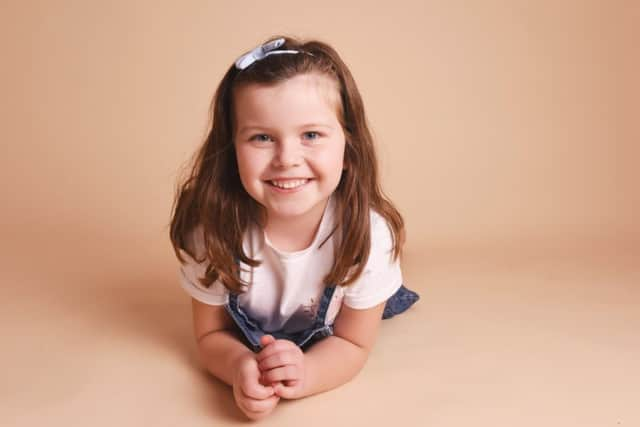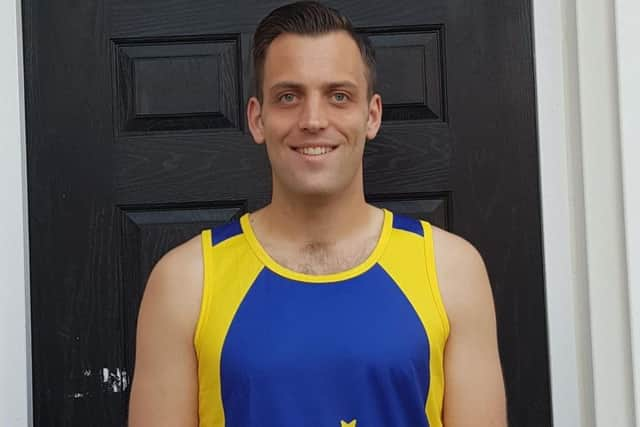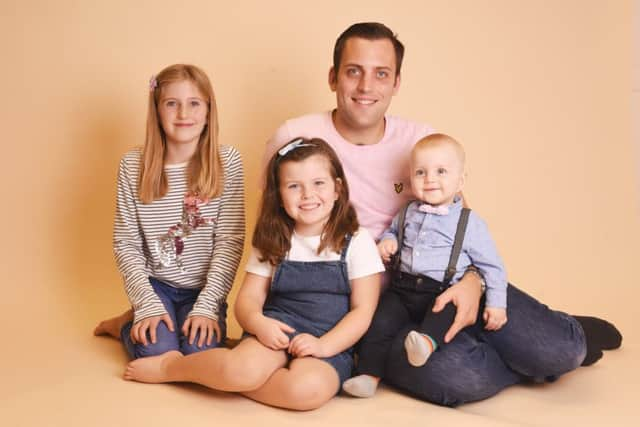Little Amelia’s rare condition means she can never be alone


The youngster suffers from a rare disease which means her body creates too much insulin, leading to life-threateningly low blood sugar levels and so has to be constantly monitored.
Amelia was diagnosed with congenital hyperinsulinism (CHI) at just a few weeks old, a disease which affects one in 50,000 people.
Advertisement
Hide AdAdvertisement
Hide AdIt means Amelia has to have her blood sugar levels checked regularly, have injections four times a day, live on a strict diet regime and be attached to a special pump at night that administers her sugary water.


It means doing many of the things that other little girls her age do, such as sleepovers, are impossible for Amelia.
Now her dad Alan, 31, from Keighley, will be running the Virgin Money London Marathon on Sunday April 28 – his first marathon – to raise money for Sparks children’s medical research charity which funds research into rare children’s conditions.
CHI usually begins at birth and causes symptoms such as loose or floppy muscles, shakiness, poor feeding, and seizures.
Advertisement
Hide AdAdvertisement
Hide AdDad-of-three Alan, who works for the Royal Air Force explains: “Amelia weighed 10lbs when she was born and within three or four hours she’d had a blood sugar test due to the fact she was a big baby. It was low which they said was down to her being big and in a couple of days it should rectify itself.”


But after three weeks Amelia’s blood sugar levels had not improved and she was transferred to Great Ormond Street Hospital in London where they did further tests and she was diagnosed with CHI.
“Congenital Hyperinsulinism is a rare condition where the pancreas secretes too much insulin and if left untreated can cause issues such as brain damage and could ultimately lead to death,” explains Alan.
After more than three months in hospital Amelia was allowed home for her first Christmas but had to go back into hospital on January 2 for another month.
Advertisement
Hide AdAdvertisement
Hide Ad“It was a huge learning curve for all of us, but particularly for my wife who stayed with Amelia in Great Ormond Street while I stayed up here with our other little girl Ellie who was only six at the time.
“We visited as much as we could. I had time off from work and the RAF were really helpful.”
Even after she was eventually allowed back home, within five months Amelia was back in hospital with a virus that saw her end up in intensive care.
“We had never heard of CHI and we suddenly had to learn how to look after her,” recalls Alan. One of the hardest things, he says, was nighttime as Amelia had to have her blood sugar levels checked every hour throughout the night
“We’d take it in turns but it was exhausting.”
Advertisement
Hide AdAdvertisement
Hide AdAmelia now has a special feed pump fitted at night which administers her with sugary water to try to maintain her blood sugar levels.
Another hard and distressing part of her treatment are the injections that she has to have four times a day.
“The injections were arguably easier at the beginning when she was a baby because she didn’t know any different,” says Alan.
“But now being six years old, she knows exactly what’s coming, knows exactly how it feels. Even though she now understands why she’s having them, it’s been harder as she’s got older. Also people don’t always understand as she looks so well most of the time. At school Amelia has to have a one to one support worker to ensure she stays healthy and eats at the right times.
“This is her life for the foreseeable future,” says Alan.
Joining team Sparks was an easy decision, he says.
Advertisement
Hide AdAdvertisement
Hide Ad“The fact that Sparks is funding research into rare diseases is really important. It’s also about people having an awareness of these rare diseases. Amelia is so jolly and bright so when we suddenly have to give her an injection, people are often surprised that there is anything wrong with her and when we explain it, they say ‘Oh we’ve never heard of that’.”
By taking on the 26.2-mile challenge, Alan hopes to raise awareness of his daughter’s disease and raise vital funds for Sparks to fund pioneering children’s medical research.
“Being a part of the military network means that I’ve quite a few friends here, there, and everywhere so I tend to get the odd fiver chucked in, but if ten people give a fiver then that’s £50 and it all makes a difference.”
He has already hit his initial target of £2,000 but with help from his colleagues who are doing other events he hopes to raise even more.
Advertisement
Hide AdAdvertisement
Hide AdLaura Savory, head of community fundraising at Sparks Children’s Medical Research Charity, said: “We’re really grateful to Alan and all our supporters for taking part in this fantastic challenge. With their help we can make a real difference to pioneering children’s medical research. We can’t wait to be there on the day to cheer everyone on.”
As for Amelia, Alan and his wife hope that it may be something she could grow out of but at the moment they take it day at a time.
“She handles it really well, but there are times when she gets frustrated and fed up with having injections all the time and having to be so careful at things like parties, But we have found that people are really good and they ask us before asking her, to avoid any disappointment.”
It isn’t known why Amelia was born with CHI when her siblings Ellie-Rose and now baby Harry don’t have the condition.
“I suppose she was just unlucky,” says Alan.
www.justgiving.com/AClough1987
Advertisement
Hide AdAdvertisement
Hide AdMore than 79 runners will take part on behalf of Sparks who are hoping to raise more than £200,000.
All the money raised will help Sparks to fund pioneering children’s medical research around the UK.
Children’s futures are at the heart of Sparks, who fund ground-breaking research into a wide range of rare childhood conditions. Many of the pioneering projects supported by Sparks are carried out at leading hospitals and universities throughout the UK and continue to make a significant contribution to breakthroughs and new treatments being used by doctors all over the world.
www.sparks.org.uk